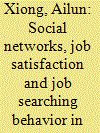| Srl | Item |
| 1 |
ID:
156610


|
|
|
|
|
| Summary/Abstract |
Using an institutional perspective, this paper explores coexisting job search methods in reforming China. Analysis of the 2003 Chinese General Social Survey data shows that China's labour markets are segmented into institutional niches by two key factors: the type of ownership of work organization and the status of the work organization in the market. The effectiveness of job search methods varies across the different institutional niches. Hierarchical arrangements and social networks remain powerful means of obtaining jobs in the state sector, including both monopolistic and competitive work organizations, while job searches using a market-oriented method are comparatively useful for winning jobs in the non-state sector irrespective of whether organizations are competitive or monopolistic in terms of market competition. This paper not only illustrates the value of an institutional approach to labour market research but also reveals the scope of market penetration in China's emerging labour markets.
|
|
|
|
|
|
|
|
|
|
|
|
|
|
|
|
| 2 |
ID:
159028


|
|
|
|
|
| Summary/Abstract |
This study first investigates determinants of job searching strategies and then examines if social networks are connected with better job outcomes. Unlike previous studies that focus solely on income, this paper pays more heed to job satisfaction. Based on data drawn from China General Social Survey, we find that disadvantaged job seekers rely primarily on informal channels; whereas experienced and better-educated job seekers tend to search for jobs through formal channels. However, those reaping the largest benefit from using networks are the job seekers who are able to use formal and informal channels jointly. By disaggregating the whole sample, we further find that the promoting effect of network use is contingent on factors such as gender and types of jobs. Network use brings about larger benefits to female and job seekers target to prestigious occupations. Finally, it appears that whether a job seeker can receive influential help depends primarily on the social status of the contacts rather than their tie strength. The results of our paper thus urge us to examine the combination of different searching strategies rather than studying them separately.
|
|
|
|
|
|
|
|
|
|
|
|
|
|
|
|
| 3 |
ID:
147418


|
|
|
|
|
| Summary/Abstract |
Job search procedures are a form of human capital investment in that they involve current investments to enhance future returns, analogous to human capital investments in areas such as education, training and mobility that yield future returns. While the theoretical and empirical literature on job search is extensive, most of it involves developed countries. There is less on developing countries and very little on China involving migrant workers in spite of their growing practical and policy importance and the fact that they are constantly engaging in job search. This paper examines the use and impact of job search procedures used by migrant workers in China by taking advantage of a rich data set on migrant workers that has information on their job search procedure as well as a wide array of other personal and human capital characteristics. Our OLS estimates indicate that there is no effect on earnings of using informal versus formal job search procedures for migrant workers in China. However, our IV results suggest that the OLS estimates are subject to severe selection bias from the fact that the choice of job search procedure is endogenous, associated with unobservable factors that affect the choice of informal versus formal procedures and that affect the earnings outcome. Our three different IV estimates designed to deal with this bias indicate that informal procedures (various aspects of family and friends) are associated with earnings that are 33 to 43% below the uses of more formal procedures. The decomposition results indicate that the most important variable contributing to pay advantage of those who use formal as opposed to informal procedures is education. In sum, our results suggest that policies to encourage or facilitate migrant workers using more formal job search procedures and reducing barriers that compel them to rely on informal procedures can yield better job matches with higher earnings.
|
|
|
|
|
|
|
|
|
|
|
|
|
|
|
|